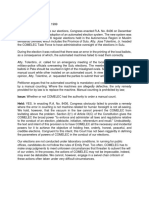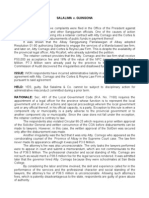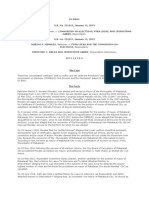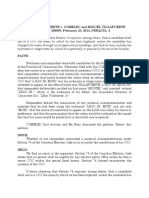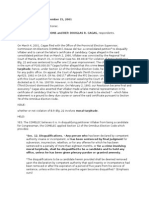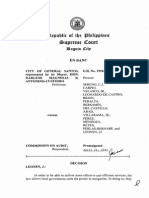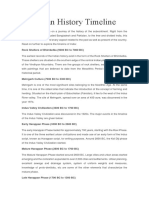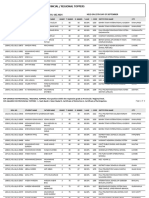0%(1)0% found this document useful (1 vote)
990 viewsLonzanida vs. COMELEC
Lonzanida vs. COMELEC
Uploaded by
asg_jing1) Petitioner Lonzanida served two terms as mayor of San Antonio, Zambales from 1988 to 1995. In 1995, he was proclaimed winner but his opponent contested and the COMELEC eventually declared the opponent the winner in 1997.
2) In 1998, Lonzanida ran for mayor again but his opponent sought to disqualify him, arguing he served three consecutive terms. COMELEC ruled against disqualification but petitioner appealed.
3) The Supreme Court ruled against COMELEC and in favor of disqualification. It held that Lonzanida's term from 1995-1998 did not count as he was not validly elected in 1995 and did not fully serve after being ordered
Copyright:
Attribution Non-Commercial (BY-NC)
Available Formats
Download as DOC, PDF, TXT or read online from Scribd
Lonzanida vs. COMELEC
Lonzanida vs. COMELEC
Uploaded by
asg_jing0%(1)0% found this document useful (1 vote)
990 views2 pages1) Petitioner Lonzanida served two terms as mayor of San Antonio, Zambales from 1988 to 1995. In 1995, he was proclaimed winner but his opponent contested and the COMELEC eventually declared the opponent the winner in 1997.
2) In 1998, Lonzanida ran for mayor again but his opponent sought to disqualify him, arguing he served three consecutive terms. COMELEC ruled against disqualification but petitioner appealed.
3) The Supreme Court ruled against COMELEC and in favor of disqualification. It held that Lonzanida's term from 1995-1998 did not count as he was not validly elected in 1995 and did not fully serve after being ordered
Copyright
© Attribution Non-Commercial (BY-NC)
Available Formats
DOC, PDF, TXT or read online from Scribd
Share this document
Did you find this document useful?
Is this content inappropriate?
1) Petitioner Lonzanida served two terms as mayor of San Antonio, Zambales from 1988 to 1995. In 1995, he was proclaimed winner but his opponent contested and the COMELEC eventually declared the opponent the winner in 1997.
2) In 1998, Lonzanida ran for mayor again but his opponent sought to disqualify him, arguing he served three consecutive terms. COMELEC ruled against disqualification but petitioner appealed.
3) The Supreme Court ruled against COMELEC and in favor of disqualification. It held that Lonzanida's term from 1995-1998 did not count as he was not validly elected in 1995 and did not fully serve after being ordered
Copyright:
Attribution Non-Commercial (BY-NC)
Available Formats
Download as DOC, PDF, TXT or read online from Scribd
Download as doc, pdf, or txt
0%(1)0% found this document useful (1 vote)
990 views2 pagesLonzanida vs. COMELEC
Lonzanida vs. COMELEC
Uploaded by
asg_jing1) Petitioner Lonzanida served two terms as mayor of San Antonio, Zambales from 1988 to 1995. In 1995, he was proclaimed winner but his opponent contested and the COMELEC eventually declared the opponent the winner in 1997.
2) In 1998, Lonzanida ran for mayor again but his opponent sought to disqualify him, arguing he served three consecutive terms. COMELEC ruled against disqualification but petitioner appealed.
3) The Supreme Court ruled against COMELEC and in favor of disqualification. It held that Lonzanida's term from 1995-1998 did not count as he was not validly elected in 1995 and did not fully serve after being ordered
Copyright:
Attribution Non-Commercial (BY-NC)
Available Formats
Download as DOC, PDF, TXT or read online from Scribd
Download as doc, pdf, or txt
You are on page 1of 2
Lonzanida vs.
COMELEC government official from running for the
July 28, 1999 | Gonzaga-Reyes same position after serving three
consecutive terms. The said
Facts: disqualification was primarily intended to
Petitioner Romeo Lonzanida was duly forestall the accumulation of massive
elected and served two consecutive terms political power by an elective local
as municipal mayor of San Antonio, government official in a given locality in
Zambales prior to the May 8, 1995 order to perpetuate his tenure in office.
elections. In the May 1995 elections The delegates also considered the need to
Lonzanida ran for mayor of San Antonio, broaden the choices of the electorate of
Zambales and was again proclaimed the candidates who will run for office, and
winner. He assumed office and discharged to infuse new blood in the political arena
the duties thereof. His proclamation in by disqualifying officials from running for
1995 was however contested by his then the same office after a term of nine years.
opponent Juan Alvez who filed an election The drafters however, recognized and took
protest. In 1997, the RTC of Zambales note of the fact that some local
declared a failure of elections. After a government officials run for office before
revision and re-appreciation of the they reach forty years of age; thus to
contested ballots, COMELEC declared perpetually bar them from running for the
Alvez the duly elected mayor of San same office after serving nine consecutive
Antonio, Zambales and ordered petitioner years may deprive the people of qualified
to vacate the post. candidates to choose from. As finally
voted upon, it was agreed that an elective
In the May 11, 1998 elections Lonzanida local government official should be barred
again ran for mayor. His opponent from running for the same post after three
Eufemio Muli filed a petition to disqualify consecutive terms. After a hiatus of at
Lonzanida from running for mayor of San least one term, he may again run for the
Antonio in the 1998 elections on the same office.
ground that he had served three
consecutive terms in the same post. In Borja vs. COMELEC, the Court sets two
conditions which must concur in order to
COMELEC: Lonzanida's assumption of disqualify elective local officials from
office by virtue of his proclamation in May serving more than three consecutive
1995, although he was later unseated terms: 1) that the official concerned has
before the expiration of the term, should been elected for three consecutive terms
be counted as service for one full term in in the same local government post and 2)
computing the three term limit under the that he has fully served three consecutive
Constitution and the Local Government terms.
Code.
In this case, the two requisites for the
Issue: application of the three term rule are
WON petitioner Lonzanida's assumption of absent. First, the petitioner cannot be
office as mayor of San Antonio Zambales considered as having been duly elected to
from May 1995 to March 1998 may be the post in the May 1995 elections. After a
considered as service of one full term for re-appreciation and revision of the
the purpose of applying the three-term contested ballots the COMELEC itself
limit for elective local government officials declared by final judgment that petitioner
– NO. Lonzanida lost in the May 1995 mayoral
elections and his previous proclamation as
Held: winner was declared null and void. His
The records of the 1986 Constitutional assumption of office as mayor cannot be
Commission show that the three-term limit deemed to have been by reason of a valid
which is now embodied in section 8, Art. X election but by reason of a void
of the Constitution was initially proposed proclamation. A proclamation
to be an absolute bar to any elective local subsequently declared void is no
proclamation at all and while a proclaimed disqualification is pending before the
candidate may assume office on the COMELEC does not divest the COMELEC of
strength of the proclamation of the Board jurisdiction to continue hearing the case
of Canvassers he is only a presumptive and to resolve it on the merits. The
winner who assumes office subject to the outright dismissal of the petition for
final outcome of the election disqualification filed before the election
protest. Petitioner Lonzanida did not serve but which remained unresolved after the
a term as mayor of San Antonio, Zambales proclamation of the candidate sought to
from May 1995 to March 1998 because he be disqualified will unduly reward the said
was not duly elected to the post; he candidate and may encourage him to
merely assumed office as presumptive employ delaying tactics to impede the
winner, which presumption was later resolution of the petition until after he has
overturned by the COMELEC when it been proclaimed.
decided with finality that Lonzanida lost in
the May 1995 mayoral elections.
Second, the petitioner cannot be deemed
to have served the May 1995 to 1998 term
because he was ordered to vacate his post
before the expiration of the term. He did
not fully serve three consecutive terms.
Voluntary renunciation of a term does not
cancel the renounced term in the
computation of the three term limit;
conversely, involuntary severance from
office for any length of time short of the
full term provided by law amounts to an
interruption of continuity of service. The
petitioner vacated his post a few months
before the next mayoral elections, not by
voluntary renunciation but in compliance
with the legal process of writ of execution
issued by the COMELEC to that effect.
Such involuntary severance from office is
an interruption of continuity of service and
thus, the petitioner did not fully serve the
1995-1998 mayoral term.
The delay in resolving the election protest
between petitioner and his then opponent
Alvez which took roughly about three
years cannot serve as basis to bar
petitioner’s right to be elected.
The petitioner's contention that the
COMELEC ceased to have jurisdiction over
the petition for disqualification after he
was proclaimed winner is without merit.
The instant petition for disqualification
was filed on April 21, 1998 or before the
May 1998 elections and was resolved on
May 21, 1998 or after the petitioner's
proclamation. Proclamation nor the
assumption of office of a candidate
against whom a petition for
You might also like
- Abundo Vs COMELEC DigestDocument1 pageAbundo Vs COMELEC DigestClaire Culminas100% (2)
- Aratea V ComelecDocument4 pagesAratea V Comelecattyalan83% (6)
- Asistio Vs Aguirre DigestDocument1 pageAsistio Vs Aguirre Digestmrspotter100% (2)
- Latasa Vs COMELEC DigestDocument2 pagesLatasa Vs COMELEC Digestgrace100% (4)
- Velasco Vs COMELECDocument1 pageVelasco Vs COMELECJomar Teneza100% (1)
- Ang vs. TeodoroDocument2 pagesAng vs. Teodoroasg_jingNo ratings yet
- Manila International Airport Authority vs. City of PasayDocument3 pagesManila International Airport Authority vs. City of Pasayasg_jing100% (3)
- Lonzanida Vs COMELEC DigestDocument2 pagesLonzanida Vs COMELEC DigestgraceNo ratings yet
- Adormeo Vs ComelecDocument2 pagesAdormeo Vs ComelecRaymond RoqueNo ratings yet
- RIVERA III V COMELECDocument3 pagesRIVERA III V COMELECJ CaparasNo ratings yet
- Ong V AlegreDocument2 pagesOng V AlegreAnonymous 5MiN6I78I0No ratings yet
- Lonzanida Vs Comelec Digest PDFDocument2 pagesLonzanida Vs Comelec Digest PDFSam Maulana100% (4)
- Lonzanida Vs ComelecDocument2 pagesLonzanida Vs ComelecElyn ApiadoNo ratings yet
- DIGEST-Sinaca vs. MulaDocument1 pageDIGEST-Sinaca vs. MulaRhett Gaerlan100% (3)
- Tallado V. ComelecDocument3 pagesTallado V. ComelecLorelain ImperialNo ratings yet
- Pub Corp - Case Digests 06 (Word)Document40 pagesPub Corp - Case Digests 06 (Word)Odette JumaoasNo ratings yet
- Ong v. AlegreDocument2 pagesOng v. AlegreNoreenesse SantosNo ratings yet
- Relampagos vs. CumbaDocument1 pageRelampagos vs. CumbaJessamine OrioqueNo ratings yet
- Latasa Vs Comelec DigestDocument3 pagesLatasa Vs Comelec DigestMa Gabriellen Quijada-TabuñagNo ratings yet
- Sevilla vs. Comelec DigestDocument3 pagesSevilla vs. Comelec DigestEmir Mendoza100% (1)
- Lopez JR Vs ComelecDocument3 pagesLopez JR Vs ComelecRaymond RoqueNo ratings yet
- 085 - Cerafica V COMELECDocument3 pages085 - Cerafica V COMELECDaine BascoNo ratings yet
- Socrates vs. COMELECDocument3 pagesSocrates vs. COMELECKristine JoyNo ratings yet
- Banaga JR v. ComelecDocument2 pagesBanaga JR v. ComelecKaryl Mae Bustamante OtazaNo ratings yet
- Akbayan Youth V COMELEC G.R No. 147066, March 26, 2001 Buena, JDocument2 pagesAkbayan Youth V COMELEC G.R No. 147066, March 26, 2001 Buena, Jsmtm06100% (2)
- Trinidad Vs ComelecDocument2 pagesTrinidad Vs ComelecAthena SantosNo ratings yet
- 3 Term Limit IssuesDocument11 pages3 Term Limit IssuesIvy Noreen TabañagNo ratings yet
- Jalover V Dela PenaDocument9 pagesJalover V Dela PenaGladys BantilanNo ratings yet
- Quilala v. COMELEcDocument2 pagesQuilala v. COMELEcRaymond RoqueNo ratings yet
- Loong v. Comelec DIGESTDocument1 pageLoong v. Comelec DIGESTApril0% (1)
- Monsale V NicoDocument1 pageMonsale V NicoKimberly MagnoNo ratings yet
- Aguinaldo Vs SantosDocument2 pagesAguinaldo Vs SantosJairus Adrian VilbarNo ratings yet
- Talaga Vs ComelecDocument3 pagesTalaga Vs ComelecCleinJonTiu100% (2)
- Caballero v. Commission On Elections G.R. No. 209835 FactsDocument2 pagesCaballero v. Commission On Elections G.R. No. 209835 FactsOleksandyr UsykNo ratings yet
- Caasi Vs ComelecDocument1 pageCaasi Vs ComelecReymark RadjuliNo ratings yet
- Montebon Vs ComelecDocument2 pagesMontebon Vs ComelecRaymond Roque100% (1)
- Gamboa v. Aguirre DigestDocument3 pagesGamboa v. Aguirre DigestAnit EmersonNo ratings yet
- SC PIO Summary of Jalosjos v. COMELEC, G.R. No. 205033, June 18, 2013Document3 pagesSC PIO Summary of Jalosjos v. COMELEC, G.R. No. 205033, June 18, 2013The Supreme Court Public Information Office100% (1)
- Japson Vs ComelecDocument2 pagesJapson Vs Comelecrodel_odzNo ratings yet
- Salalima v. GuingonaDocument1 pageSalalima v. GuingonaRaymond RoqueNo ratings yet
- Halili V COMELECDocument9 pagesHalili V COMELECKonrad Ibabao100% (1)
- Adormeo v. COMELECDocument2 pagesAdormeo v. COMELECashNo ratings yet
- Abundo, Sr. V Comelec GR No. 201716Document2 pagesAbundo, Sr. V Comelec GR No. 201716Adfat Pandan100% (2)
- Borja Vs Comelec Case DigestDocument4 pagesBorja Vs Comelec Case DigestGe Lato50% (2)
- Hayudini v. ComelecDocument2 pagesHayudini v. ComelecThea Barte100% (1)
- Sinaca VS Mula and ComelecDocument3 pagesSinaca VS Mula and ComelecBeya AmaroNo ratings yet
- Alforque - Luis R. Villafuerte v. Comelec and Miguel VillafuerteDocument2 pagesAlforque - Luis R. Villafuerte v. Comelec and Miguel Villafuertejimmie alforque100% (1)
- Montebon vs. COMELEC Research NotesDocument1 pageMontebon vs. COMELEC Research NotesOnnie Lee100% (1)
- Banaga v. Comelec DigestDocument3 pagesBanaga v. Comelec DigestJacinto Jr JameroNo ratings yet
- Abundo vs. ComelecDocument2 pagesAbundo vs. Comelecasg_jingNo ratings yet
- Timbol Vs COMELECDocument2 pagesTimbol Vs COMELECKeilah Arguelles100% (2)
- Administrative Investigations and Appeals: GR No. 160791 - Sales v. Carreon JRDocument1 pageAdministrative Investigations and Appeals: GR No. 160791 - Sales v. Carreon JRjci028No ratings yet
- Ututalum v. COMELECDocument3 pagesUtutalum v. COMELECLance LagmanNo ratings yet
- Mercado v. Manzano Case DigestDocument2 pagesMercado v. Manzano Case Digestjean_bernardes86% (7)
- Castillo Poli Saño v. COMELECDocument4 pagesCastillo Poli Saño v. COMELECkjhenyo218502No ratings yet
- Villamor v. ComelecDocument2 pagesVillamor v. Comelecrgtan3No ratings yet
- Cerafica v. ComelecDocument1 pageCerafica v. ComelecMan2x SalomonNo ratings yet
- 258 - Dumayas V ComelecDocument3 pages258 - Dumayas V ComelecPatrick CabañeroNo ratings yet
- Tagolino Vs HRET and Lucy Torres Gomez DigestDocument1 pageTagolino Vs HRET and Lucy Torres Gomez DigestRonellie Marie TinajaNo ratings yet
- Villaber Vs COMELECDocument2 pagesVillaber Vs COMELECLeah Marie Sernal100% (4)
- Lonzanida Vs COMELECDocument2 pagesLonzanida Vs COMELECxsar_xNo ratings yet
- L 32. Lonzanida vs. COMELECDocument2 pagesL 32. Lonzanida vs. COMELECPrecious100% (1)
- Abundo vs. ComelecDocument2 pagesAbundo vs. Comelecasg_jingNo ratings yet
- L/Epublic of Tbe: I Upreme QcourtDocument9 pagesL/Epublic of Tbe: I Upreme Qcourtasg_jingNo ratings yet
- Laysa vs. COADocument2 pagesLaysa vs. COAasg_jingNo ratings yet
- Coa C2019-001 PDFDocument14 pagesCoa C2019-001 PDFasg_jingNo ratings yet
- OCA Circular No. 90 2018 PDFDocument9 pagesOCA Circular No. 90 2018 PDFasg_jingNo ratings yet
- Versoza vs. CaragueDocument45 pagesVersoza vs. Caragueasg_jingNo ratings yet
- Republic of The Philippines Supreme Court ManilaDocument17 pagesRepublic of The Philippines Supreme Court Manilaasg_jing0% (1)
- Tesda vs. COADocument12 pagesTesda vs. COAasg_jingNo ratings yet
- City of General Santos vs. COADocument23 pagesCity of General Santos vs. COAasg_jingNo ratings yet
- Funa vs. VillarDocument51 pagesFuna vs. Villarasg_jingNo ratings yet
- COA Circular 2009-006Document48 pagesCOA Circular 2009-006joannecatimbang100% (1)
- BC-No.-10.PDF Guidelines On Overtime PayDocument4 pagesBC-No.-10.PDF Guidelines On Overtime Payacir_05No ratings yet
- Domdom vs. Sandiganbayan (February 24, 2010) PDFDocument4 pagesDomdom vs. Sandiganbayan (February 24, 2010) PDFasg_jingNo ratings yet
- Contrato de Trabajo InglesDocument10 pagesContrato de Trabajo InglesFelipe UrderoNo ratings yet
- Samaria Rice Second Letter To County ProsecutorDocument3 pagesSamaria Rice Second Letter To County ProsecutorsandydocsNo ratings yet
- Matthew 21-28 QuizDocument22 pagesMatthew 21-28 QuiznathankfosbNo ratings yet
- Charlie Brooker - The Hell of It AllDocument527 pagesCharlie Brooker - The Hell of It Alldamedavid100% (2)
- 2014.07.07 Transcript of Temporary Restraining Order HearingDocument31 pages2014.07.07 Transcript of Temporary Restraining Order HearingabdNo ratings yet
- Policy 413 LgbtiDocument11 pagesPolicy 413 Lgbtijordangwendolyn712No ratings yet
- Shahadat Naama by Kulmohan SinghDocument32 pagesShahadat Naama by Kulmohan Singhtasleemlaiba290No ratings yet
- 050 Sepulveda V PelaezDocument2 pages050 Sepulveda V PelaezTristan HaoNo ratings yet
- Dugi Telegram - Dzordz Kenan 1946.Document9 pagesDugi Telegram - Dzordz Kenan 1946.ObrazovanjeOdraslihNo ratings yet
- Indian History TimelineDocument5 pagesIndian History TimelineRohan PandhareNo ratings yet
- READMEDocument2 pagesREADMEFlorian BăceanuNo ratings yet
- Citizen Suit Provisions in IndiaDocument2 pagesCitizen Suit Provisions in IndiaAnamika SinghNo ratings yet
- Our Man in Yugoslavia-Reviewed by Christopher DelisoDocument6 pagesOur Man in Yugoslavia-Reviewed by Christopher Delisokrca100% (1)
- FDP Iase 2021december13 18 BrochureDocument3 pagesFDP Iase 2021december13 18 BrochureSANSKRITI SINGHNo ratings yet
- Ethics Legal Issues in Psychiatry Group 7Document91 pagesEthics Legal Issues in Psychiatry Group 7Shah OzairNo ratings yet
- School Memo s.2024Document5 pagesSchool Memo s.2024John Cyrill manubaNo ratings yet
- PROVINCIAL-TOPPERS-PUNJAB-SCIENCE-CONTEST-VOL-16-2024Document8 pagesPROVINCIAL-TOPPERS-PUNJAB-SCIENCE-CONTEST-VOL-16-2024writerreader26No ratings yet
- Thank You, Veterans (November 2023)Document8 pagesThank You, Veterans (November 2023)The Livingston County NewsNo ratings yet
- BA No.33 of 2015, Nauman Qureshi 489 F ReportedDocument10 pagesBA No.33 of 2015, Nauman Qureshi 489 F ReportedAli RockkNo ratings yet
- Specific PerformanceDocument10 pagesSpecific PerformanceDominic EmbodoNo ratings yet
- "Pierced by Bronze Needles": Anti-Montanist Charges of Ritual Stigmatization in Their Fourth-Century ContextDocument32 pages"Pierced by Bronze Needles": Anti-Montanist Charges of Ritual Stigmatization in Their Fourth-Century ContextMarwa SaiedNo ratings yet
- Judgment El Kaada v. Germany - Revocation of Suspension of SentenceDocument3 pagesJudgment El Kaada v. Germany - Revocation of Suspension of SentencePZNo ratings yet
- Manning Constitutional Reforms in Sri LankaDocument15 pagesManning Constitutional Reforms in Sri LankaMohamed IrshadNo ratings yet
- Date! (A1) FundamentalsDocument40 pagesDate! (A1) FundamentalsAce-ova KingNo ratings yet
- Body Image Disturbance NCPDocument2 pagesBody Image Disturbance NCPPaulo de JesusNo ratings yet
- AIBE - PIL in Latest JudgmentDocument3 pagesAIBE - PIL in Latest JudgmentBhanu prakashNo ratings yet
- 20 Idioms With Their Meanings and SentencesDocument6 pages20 Idioms With Their Meanings and SentencesNET ZONENo ratings yet
- Benrus Watch Co. v. KirschDocument4 pagesBenrus Watch Co. v. KirschSGVNo ratings yet
- Sample Statement of ClaimDocument4 pagesSample Statement of ClaimNaveen DeswalNo ratings yet
- Willing RepresentativesDocument6 pagesWilling Representativesiqrakiran25No ratings yet





























